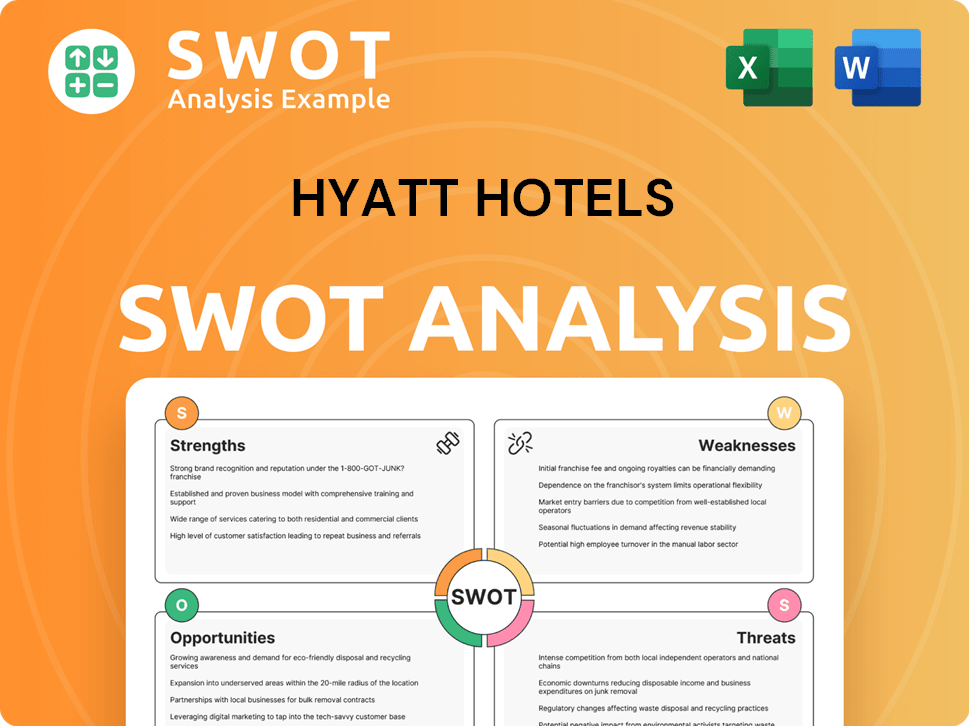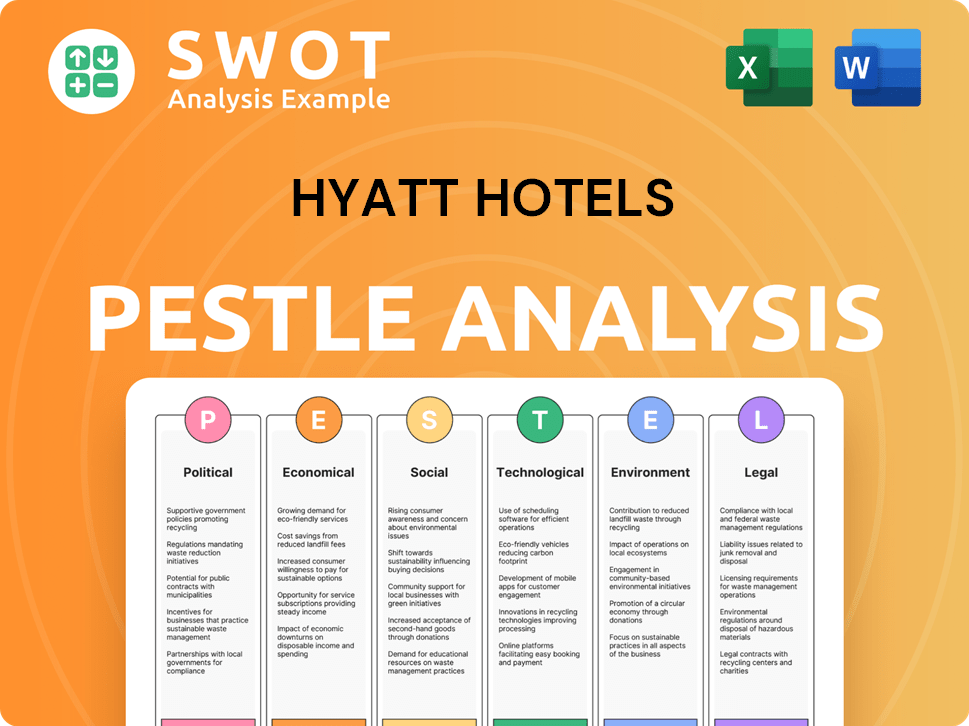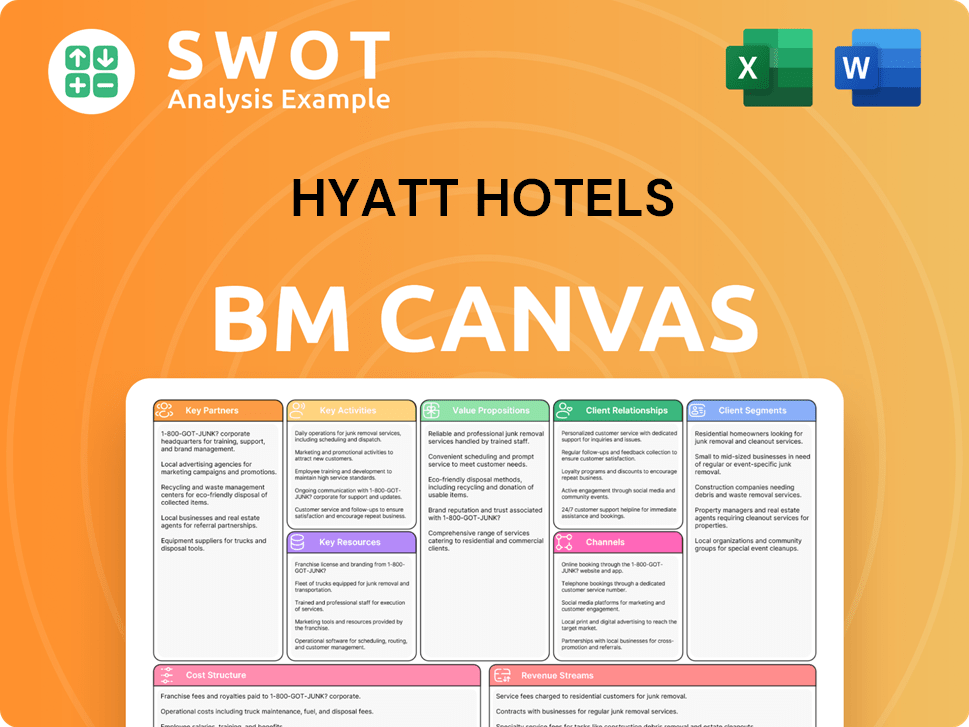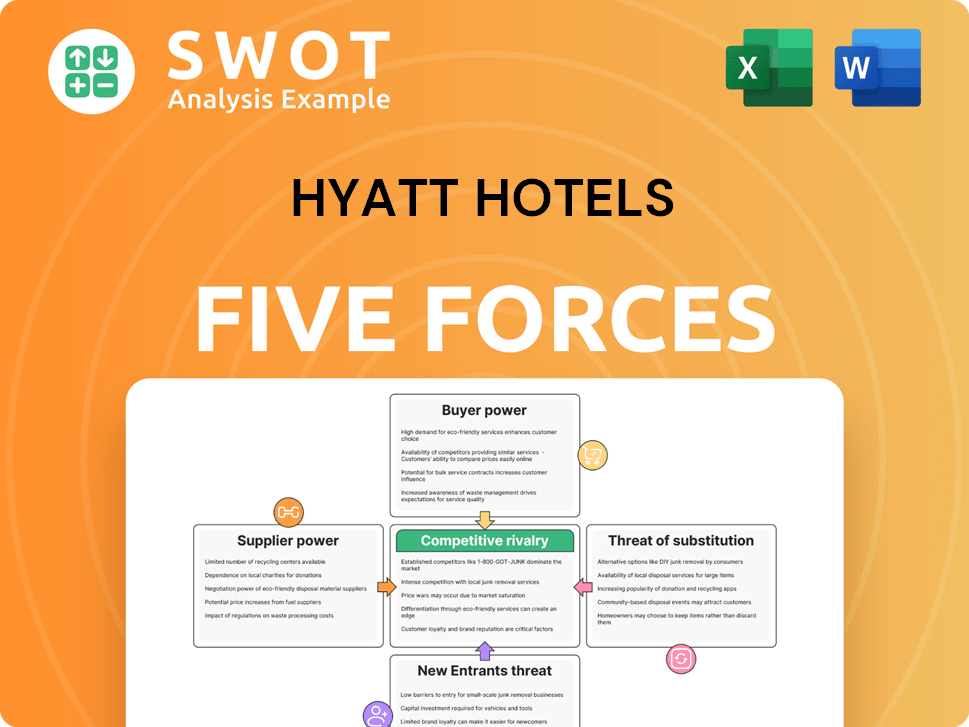Hyatt Hotels Bundle
How Does Hyatt Hotels Company Stack Up in Today's Hospitality Race?
The Hyatt Hotels SWOT Analysis reveals a dynamic player in the ever-evolving hotel industry. With the global hospitality sector constantly reshaping itself, understanding the competitive landscape is crucial for any investor or strategist. This deep dive explores Hyatt Hotels Company's position, its rivals, and the strategies it employs to thrive.

This detailed examination of the Hyatt Hotels Company's competitive landscape will provide critical insights for anyone interested in the hotel industry analysis. We'll dissect Hyatt's market share, perform a thorough competitor analysis, and examine the impact of market trends, especially within the luxury hotel segment. Furthermore, we'll explore Hyatt's competitive advantages, expansion plans, and financial performance compared to its main competitors, including how Hyatt compares to Marriott, to offer a comprehensive understanding of its current and future prospects within the hospitality industry.
Where Does Hyatt Hotels’ Stand in the Current Market?
Hyatt Hotels Company holds a distinctive market position within the global hospitality industry, primarily focusing on the upper-upscale and luxury segments. This strategic focus differentiates it from competitors that may have a broader focus across all price points. The company also has a growing presence in select-service and lifestyle categories, expanding its reach to a wider customer base.
Hyatt's core operations revolve around managing and franchising hotels and resorts under various brands. These brands cater to different market segments, including luxury, lifestyle, and all-inclusive resorts. The company's value proposition centers on providing high-quality experiences, personalized service, and a strong loyalty program to attract and retain guests. This approach allows Hyatt to maintain a premium brand image and command higher room rates.
As of the fourth quarter of 2023, Hyatt's comparable system-wide revenue per available room (RevPAR) increased by 10.7% compared to the same period in 2022, demonstrating strong performance and demand for its brands. The company's net income attributable to Hyatt for the full year 2023 was $253 million. Hyatt's strategic asset recycling has improved its financial flexibility and profitability. This is evident in the company's Q4 2023 comparable owned and leased hotels RevPAR growth of 5.8% compared to Q4 2022.
While specific market share figures for 2024-2025 are not yet widely published, Hyatt's focus on the upper-upscale and luxury segments positions it as a key player in these markets. The company competes with major players like Marriott and Hilton, but its emphasis on premium brands and experiences allows it to differentiate itself.
Hyatt's brand portfolio includes the Timeless Collection (Park Hyatt, Grand Hyatt), Boundless Collection (Andaz, Alila), Independent Collection (Unbound Collection by Hyatt), and Inclusive Collection (all-inclusive resorts). This diverse portfolio allows Hyatt to cater to a wide range of customer preferences and price points, from luxury to lifestyle and all-inclusive vacations.
Hyatt has a significant presence in North America, with a growing global footprint, particularly in Europe, Asia-Pacific, and Latin America. The company strategically targets key urban and resort destinations to capitalize on high-demand markets and expand its brand recognition worldwide.
Over time, Hyatt has strategically shifted towards an asset-light model, divesting owned real estate and increasing its managed and franchised properties. This strategy enhances financial flexibility and profitability, allowing Hyatt to focus on brand development and customer experience. This approach is further detailed in the Growth Strategy of Hyatt Hotels.
Hyatt's competitive advantages include its strong brand reputation, focus on premium segments, and growing global presence. However, the company faces challenges such as intense competition from larger hotel chains and the need to adapt to changing market trends. The hospitality industry is dynamic, requiring constant innovation and strategic adjustments.
- Market Trends: The luxury hotel segment is experiencing growth, with travelers increasingly seeking unique and experiential stays.
- Customer Loyalty: Hyatt's loyalty program is a key factor in customer retention and driving repeat business.
- Expansion Plans: Hyatt continues to expand its brand portfolio and geographic footprint to capture market share and meet evolving consumer demands.
- Financial Performance: Hyatt's financial health, as evidenced by its robust RevPAR growth and strategic asset recycling, positions it favorably against industry averages.
Hyatt Hotels SWOT Analysis
- Complete SWOT Breakdown
- Fully Customizable
- Editable in Excel & Word
- Professional Formatting
- Investor-Ready Format

Who Are the Main Competitors Challenging Hyatt Hotels?
The competitive landscape for Hyatt Hotels Company is dynamic, shaped by a complex interplay of established global giants, specialized luxury brands, and emerging accommodation providers. Understanding this landscape is crucial for assessing Hyatt's market position and strategic direction. The hotel industry analysis reveals a constant evolution driven by consumer preferences, technological advancements, and economic cycles, influencing how companies compete for market share.
Hyatt's competitive position is further complicated by the rise of alternative accommodation providers, such as Airbnb, which have reshaped the lodging market, particularly in the leisure segment. These providers, along with regional chains and boutique hotels, add layers of competition, requiring Hyatt to continually innovate and differentiate its offerings. The impact of the pandemic and subsequent recovery has also significantly altered the competitive environment, influencing consumer behavior and operational strategies.
Hyatt Hotels Corporation faces intense competition from a diverse range of direct and indirect rivals across the global hospitality landscape. Its most significant direct competitors include other major international hotel chains such as Marriott International, Hilton Worldwide, and IHG Hotels & Resorts. These competitors challenge Hyatt through various means, including loyalty programs, expansion strategies, and technological advancements. For a deeper dive into Hyatt's growth strategies, consider reading about the Growth Strategy of Hyatt Hotels.
Marriott International, with its vast portfolio of over 8,800 properties and 30 brands across 139 countries and territories as of early 2024, poses a formidable challenge. Its scale, extensive loyalty program (Marriott Bonvoy), and broad market penetration across all segments make it a major competitor.
Hilton competes directly with Hyatt in the luxury and upscale segments with brands like Waldorf Astoria and Conrad. It offers a wide array of brands across other categories, boasting a significant global footprint and loyalty program (Hilton Honors).
IHG, with brands like InterContinental and Kimpton, also vies for market share in similar luxury and upscale niches, leveraging its global distribution network. IHG's diverse portfolio and global presence make it a significant player in the hospitality industry.
Hyatt also faces competition from smaller, specialized luxury hotel groups and boutique hotel collections. These competitors often focus on unique guest experiences and niche markets, challenging Hyatt's positioning in the luxury segment.
Alternative accommodation providers like Airbnb, while not direct hotel competitors, can impact demand for traditional lodging, particularly in the leisure segment. Their growing popularity and diverse offerings create additional competitive pressure.
Emerging players and regional chains also present localized competitive pressures, especially in high-growth markets. These chains often focus on specific geographic areas or market segments, adding complexity to the competitive dynamics.
Hyatt's competitive landscape is shaped by several key factors influencing its market share and strategic decisions. These factors include brand reputation, customer loyalty programs, geographic reach, pricing strategies, and the ability to innovate and adapt to changing market conditions. A thorough competitor analysis is essential for understanding these dynamics.
- Loyalty Programs: Marriott Bonvoy and Hilton Honors are major drivers of repeat business.
- Expansion Strategies: Aggressive acquisition of new properties and brands.
- Technological Advancements: Enhancing guest experiences and streamlining operations.
- Market Segmentation: Competition across luxury, upscale, and other segments.
- Geographic Presence: Global footprint and market penetration in key regions.
Hyatt Hotels PESTLE Analysis
- Covers All 6 PESTLE Categories
- No Research Needed – Save Hours of Work
- Built by Experts, Trusted by Consultants
- Instant Download, Ready to Use
- 100% Editable, Fully Customizable

What Gives Hyatt Hotels a Competitive Edge Over Its Rivals?
The competitive landscape for Hyatt Hotels Company is shaped by its strategic focus on luxury and lifestyle brands, a customer-centric approach, and a disciplined growth strategy. Understanding the competitive advantages of Hyatt Hotels Company requires a deep dive into its brand portfolio, customer loyalty programs, and asset-light model. This approach allows for capital-efficient expansion and a focus on core competencies.
Hyatt's ability to differentiate itself in the competitive hotel industry is a key factor. The company's commitment to personalized service and a 'care' culture further sets it apart. While not the largest in terms of room count, Hyatt's curated approach ensures brand integrity and consistent service delivery.
Hyatt's competitive advantages have evolved, with increased use of technology to enhance guest experiences. The company's consistent focus on brand integrity, service quality, and a growing customer base provides a sustainable competitive edge. To learn more about the company's origins, you can read the Brief History of Hyatt Hotels.
Hyatt's portfolio of luxury and lifestyle brands, such as Park Hyatt and Andaz, allows it to command premium pricing. This brand differentiation helps Hyatt attract discerning travelers. This strategy contributes to its overall financial performance and market positioning.
The World of Hyatt loyalty program is a significant advantage, fostering deep guest engagement. It offers personalized benefits and exclusive offers, driving repeat business. In 2023, World of Hyatt membership grew by 22%.
Hyatt's asset-light strategy, focusing on management and franchising, provides financial flexibility. This approach reduces exposure to real estate market fluctuations. It allows Hyatt to concentrate on brand management and guest service.
Hyatt's commitment to personalized service and a 'care' culture differentiates it in the hospitality industry. This focus on service quality is a key factor in guest satisfaction. This commitment enhances brand reputation and customer loyalty.
Hyatt's competitive advantages include a strong brand portfolio, the World of Hyatt loyalty program, and an asset-light strategy. These elements contribute to Hyatt's ability to compete effectively in the hotel industry. Hyatt's focus on guest experience and service quality further enhances its competitive position.
- Brand Portfolio: Luxury and lifestyle brands attract discerning travelers.
- Loyalty Program: World of Hyatt drives repeat business and customer loyalty.
- Asset-Light Model: Provides financial flexibility and capital-efficient expansion.
- Service Culture: Commitment to personalized service enhances guest satisfaction.
Hyatt Hotels Business Model Canvas
- Complete 9-Block Business Model Canvas
- Effortlessly Communicate Your Business Strategy
- Investor-Ready BMC Format
- 100% Editable and Customizable
- Clear and Structured Layout

What Industry Trends Are Reshaping Hyatt Hotels’s Competitive Landscape?
The global hospitality industry is currently undergoing significant transformation, presenting both challenges and opportunities for the entire sector, including the Hyatt Hotels Company. Technological advancements, evolving consumer preferences, and regulatory changes are reshaping the competitive landscape. Understanding these dynamics is crucial for Hyatt to maintain and enhance its market position.
Hyatt faces potential disruptions from alternative accommodations and new tech-driven entrants. However, it also benefits from the growing demand for leisure travel and opportunities in emerging markets. Strategic initiatives, such as focusing on experiential travel and sustainability, are key to capitalizing on these trends and ensuring long-term growth. The company's asset-light model further strengthens its ability to navigate the evolving market.
Key trends include technological advancements, such as smart room technologies and digital guest interactions. Changing consumer preferences emphasize experiential travel, sustainability, and local immersion. The demand for sustainable travel options is increasing, with approximately 70% of global travelers in 2023 seeking more sustainable options. Regulatory changes, particularly concerning data privacy and labor laws, also play a significant role.
Hyatt anticipates challenges from the rise of alternative accommodations and tech-driven competitors. Maintaining service quality amid a competitive labor market is another concern. Global economic shifts and geopolitical instability can impact travel demand and investment. Increased competition in the hospitality industry requires constant adaptation and innovation to maintain market share.
Growing demand for leisure travel, especially in luxury and lifestyle segments, offers significant growth potential. Expansion into emerging markets, particularly in the Asia-Pacific and Middle East regions, presents new development opportunities. Innovation in wellness tourism, sustainable practices, and unique experiential offerings can further differentiate Hyatt. Strategic partnerships, such as with Lindblad Expeditions, exemplify these opportunities.
Hyatt's focus on experiential travel and sustainability is key. Leveraging technology to enhance guest experiences and maintaining resilience in a dynamic market are critical. The asset-light model supports growth without significant capital expenditure. The company's brand portfolio and customer loyalty programs play a vital role in competitive positioning.
A detailed competitive analysis of Hyatt Hotels Company reveals its strengths and weaknesses in the hospitality market. Comparing Hyatt's financial performance with competitors helps assess its market share and strategic effectiveness. Understanding the competitive advantages of Hyatt hotels, such as their brand portfolio and customer loyalty programs, is essential. Recent acquisitions by Hyatt, like the acquisition of Dream Hotel Group in 2023, will likely impact their competitive positioning.
- Market Share: Hyatt's market share is influenced by its brand portfolio and expansion strategies.
- Competitor Analysis: Key competitors include Marriott International and Hilton Worldwide.
- Financial Performance: Hyatt's financial performance is crucial for assessing its competitive standing.
- Expansion Plans: Hyatt's expansion plans, particularly in emerging markets, are key to future growth.
Hyatt Hotels Porter's Five Forces Analysis
- Covers All 5 Competitive Forces in Detail
- Structured for Consultants, Students, and Founders
- 100% Editable in Microsoft Word & Excel
- Instant Digital Download – Use Immediately
- Compatible with Mac & PC – Fully Unlocked

Related Blogs
- What are Mission Vision & Core Values of Hyatt Hotels Company?
- What is Growth Strategy and Future Prospects of Hyatt Hotels Company?
- How Does Hyatt Hotels Company Work?
- What is Sales and Marketing Strategy of Hyatt Hotels Company?
- What is Brief History of Hyatt Hotels Company?
- Who Owns Hyatt Hotels Company?
- What is Customer Demographics and Target Market of Hyatt Hotels Company?
Disclaimer
All information, articles, and product details provided on this website are for general informational and educational purposes only. We do not claim any ownership over, nor do we intend to infringe upon, any trademarks, copyrights, logos, brand names, or other intellectual property mentioned or depicted on this site. Such intellectual property remains the property of its respective owners, and any references here are made solely for identification or informational purposes, without implying any affiliation, endorsement, or partnership.
We make no representations or warranties, express or implied, regarding the accuracy, completeness, or suitability of any content or products presented. Nothing on this website should be construed as legal, tax, investment, financial, medical, or other professional advice. In addition, no part of this site—including articles or product references—constitutes a solicitation, recommendation, endorsement, advertisement, or offer to buy or sell any securities, franchises, or other financial instruments, particularly in jurisdictions where such activity would be unlawful.
All content is of a general nature and may not address the specific circumstances of any individual or entity. It is not a substitute for professional advice or services. Any actions you take based on the information provided here are strictly at your own risk. You accept full responsibility for any decisions or outcomes arising from your use of this website and agree to release us from any liability in connection with your use of, or reliance upon, the content or products found herein.